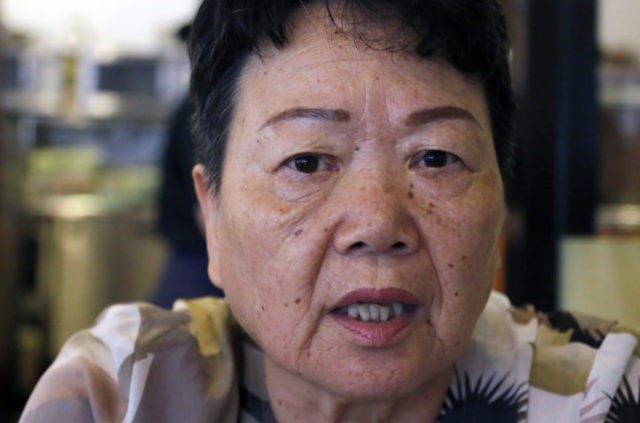A group of North Korean defectors filed suit in Tokyo this week against the regime in Pyongyang, demanding $5 million in damages for human rights violations.
The group charges North Korea with tricking Koreans who lived in Japan into repatriating after the Korean War. In essence, the litigants say North Korea lied to them about the “worker’s paradise” created by communism.
That might seem rather obvious today, but the true nature of North Korea’s hideous regime was less obvious in the 1950s when Koreans, hauled to Japan by imperial conquerors during World War II, were persuaded to return home. Pyongyang ran an operation called the General Association of Korean Residents in Japan that spent thirty years literally promising “heaven on earth” awaited those who set sail for North Korea. About 90,000 Koreans living in Japan took Pyongyang up on the offer.
The Associated Press spoke with a 76-year-old litigant named Eiko Kawasaki who said she was horrified to discover what North Korea was really like when she arrived there at the age of 17, and even more horrified to realize she bought a one-way ticket to hell:
Although she excelled in school, her family was poor. All she wanted was to continue her education. North Korea promised a scholarship.
Like many others, she realized she had been duped as soon as she landed. The port was shabby, everyone was terribly thin, and children wore rags.
“You cannot express your opinion at all,” she said, adding that everyone lived in fear, even of getting killed for saying the wrong thing. “You can’t get out of there.”
She became an engineer and married another engineer. He died, but they had five children, four of whom still live in North Korea. She defected in 2003, first to China and then to Japan in 2004, with the help of her younger brother.
In a February interview with Vice, Kawasaki told her story in even more heartbreaking detail, recalling how people thronged the dock when she boarded the boat for North Korea and screamed warnings that “the promises of free food and healthcare were all lies.”
She lived in North Korea for decades and eventually had to plot her escape without telling her children, who had been brainwashed by the dictatorship and would probably have turned her in. One of her children eventually followed her to freedom in Japan and now lives near her, while the other four remain in North Korea.
Another North Korean defector interviewed by Vice also left family behind and said her brother-in-law was tortured and murdered by the Kim regime after she escaped in 2011. She spent the entire interview nervously scanning the crowd at a Tokyo restaurant for possible North Korean agents.
One of Kawasaki’s fellow litigants, 57-year-old Ko Jong-mi, was only two years old when her family decided to accept North Korea’s invitation to live in the worker’s paradise. Her older brother had second thoughts as soon as their boat pulled up to the docks and refused to leave the ship. The North Koreans arrested him, declared him mentally ill, and threw him into a detention center where he died eight years later.
The defectors were generally happy with U.S. President Donald Trump’s firm stance against North Korea but dismayed he lightened up and took a meeting with dictator Kim Jong-un in Singapore. They warned in the strongest possible terms that Kim and his regime cannot be trusted.
“My parents who went back to North Korea with me wandered hopelessly in hell and ended their lives with regrets. The rogue nation can’t be condoned,” said another plaintiff, 68-year-old Hiroko Sakakibara.
Asahi Shimbun noted the lawsuit filed by the five defectors has a few legal hurdles to clear: “Whether legal proceedings can start depends on whether Japan’s legal system has jurisdiction over a foreign government, or whether the statute of limitations has run out for the accusations.”
Other court actions against North Korea (and in some cases past Japanese governments for colluding with it) brought mixed results, but Kawasaki and her group are determined to hit Pyongyang from every legal angle:
In February 2014, the United Nations commission of inquiry on human rights in North Korea released a report that recognized acts of human rights violation by the nation, including the historical abduction of Japanese nationals and the repatriation program, as “crimes against humanity.”
In 2015, a group of people, including the plaintiffs, lodged a petition with the Japan Federation of Bar Associations for redress of human rights from both the Japanese and North Korean governments and the pro-Pyongyang General Association of Korean Residents in Japan (Chongryon).
In February, Kawasaki filed a request to the prosecutor of the International Criminal Court to make an inquiry for possible punishment of North Korean leader Kim Jong Un and other high-ranking officials.
In recent years in the United States, there have been a number of civil cases filed at local courts against the North Korean government for human rights violations, and plaintiffs have been awarded compensation.
Human Rights Watch this week urged the Japanese government to admit its role in sending so many Koreans to live under the Kim dynasty’s hellish rule and use the public-relations opportunity presented by the lawsuit to press North Korea to allow victims of the “Heaven on Earth” fraud to return to Japan.

COMMENTS
Please let us know if you're having issues with commenting.